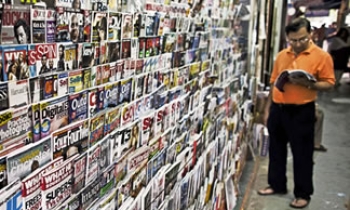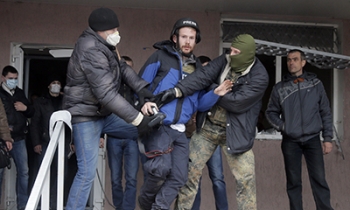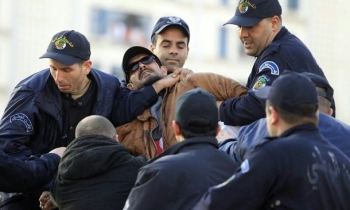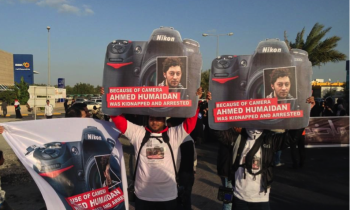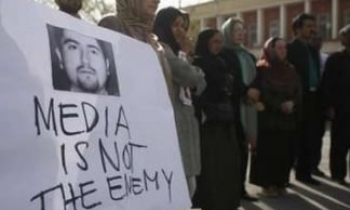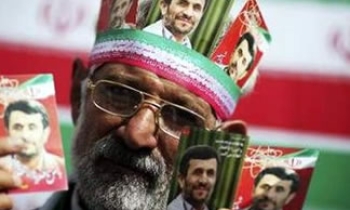On 30 September 2005 the Danish newspaper Jyllands-Posten published a number of caricatures on the subject of Islam, Muslims and the Prophet Mohammed. It had solicited these as part of a competition in which cartoonists had been asked to address the supposed fear that Danes and other Europeans felt in depicting Islam critically. In response to the publication Muslims in Denmark protested against some of the cartoons, such as that portraying Mohammed as a terrorist, with one group of protestors actively trying to gain the support of Muslim leaders in the middle east. The series of diplomatic and other representations made by Muslims to the Danish government during this period all resulted in the latter invoking the liberal principle of freedom of expression in defence of Jyllands-Posten's right to print such material.
By the end of the year this obscure event had snowballed into a global controversy, with Muslims the world over protesting, often violently, against Danish and other western interests in countries from Indonesia to Lebanon. In their non-violent aspect these demonstrations included a widespread boycott of Danish goods that was unprecedented in its extent. Such events kept the cartoon controversy at the centre of global attention for many weeks, even pushing news from the war in Iraq off the front pages. But despite the extraordinary passions unleashed among the protestors as much as among their opponents, Muslim demonstrations had completely dissipated by March 2006, leaving in their wake a state of universal confusion about what the crisis had all been about.
A new global subject
After the Salman Rushdie affair of 1989, in which Muslims protested against the author's portrayal of Mohammed in his novel The Satanic Verses, the cartoon controversy was the second great manifestation of Islam's globalisation. Interestingly, both controversies revolved around the portrayal of Islam's prophet, and both were discussed in the west as threats to freedom of expression. Now the debate on freedom of expression goes back to the origins of liberalism - or rather to the origins of the nation-state that is its political body. Sadly the terms of this debate also go back to the beginnings of liberalism, and are unable to encompass the radical novelty of the challenge that confronts it. Unlike the weight of tradition that loads down such debate, the illiberal character of Muslim protest is astonishingly modern in form. After all freedom of expression only has meaning within old-fashioned national states, because it protects the speech of one section of citizens against another, and even against the state itself. Muslim protests, on the other hand, have meaning in an absolutely new global context.
The cartoon protests were remarkably dispersed geographically, and unconcerned for the most part with the rights of states or the responsibilities of citizenship. If this unconcern were due only to ignorance or irrationality among them, such protesting Muslims might eventually be educated to become the good citizens of a liberal democracy. Unfortunately this is not the case. Muslim protests, which moved so far beyond the bounds of state and citizenship, were informed by the new rationality of a global arena. Within this arena freedom of expression's more restricted realm had been rendered irrelevant. For at the global level there is no common citizenship and no government to make freedom of expression meaningful even as an expression. Liberalism was being challenged here not by its past but by its future.
Muslim protesters did not represent some religious tradition that needs to be schooled in the lessons of modern citizenship. Rather their protests brought into being a hypermodern global community whose connections occur by way of mass media alone. From the Philippines to Niger, these men and women communicated with each other only indirectly, neither by plan nor organisation, but through the media itself. And just as in 1989, most Muslims in 2006 were hurt not by the offending item, a book read or an image seen, but by its global circulation as a media report. Yet it was this very circulation of the offending item as news that also allowed Muslims to represent themselves as a global community in, through and as the news. Moreover they could only do so by way of English as a global language. It is no accident that the cartoon controversy took the Muslim world by storm only when it was reported on the BBC and CNN. English not Arabic is the source language of global Islam.
In this hypermodern community, traditional distinctions of belief and practice have ceased to be relevant, as indeed has religion itself in an old-fashioned sense. For the generic Muslim being displayed on television screens across the world cannot be marked by any specifically theological concern. If in the Rushdie affair the explicitly religious issue of the "satanic verses" was never taken up as a cause for offence even in Ayatollah Khomeini's fatwa, Muslims protesting seventeen years later similarly made nothing of Islam's supposed proscription of the prophet's image. In any case there is a long if contested history of Muslims depicting their prophet. Such images continue to proliferate among the Shi'a, for example, without in any way dampening the outcry over the cartoons in Baghdad or Tehran.
These theological concerns are in fact interesting only to the defenders of liberal democracy, who think of challenges to its freedoms in terms that are a few centuries out of date. That it should be a religious group demonstrating its globalisation here is in any case consonant with liberalism's past. For the nation-state was founded to subdue religion, seen as the only entity capable of providing an alternative foundation for political life. So it is only natural if today Islam seems to confront the liberal state with its own founding myth, having become the Frankenstein's monster of its history. Liberal democracy appears doomed to repeat its own past by the way in which it prefigures its enemies - always understood as offering politics alternative foundations like that of religion. If not religion, then anarchism, fascism or some other historical rival of the liberal state comes to occupy this role in the long-running comedy of its founding. But this is not true of global Islam, which should be defined in terms of liberalism's future instead of its past.
As in the Rushdie affair, the prophet insulted by some Danish cartoons is not a religious figure of any traditional sort. In 1989 it was Mohammed as husband and family man who stood impugned in the eyes of protesters. Many protesters in the new century continued to express their hurt by comparing the prophet to members of their "family", hardly a religious role for him to play and one of dubious orthodoxy in any case. This is language that belongs more in the Christian than the Muslim tradition. In fact Mohammed as father, husband and family man has become a role model of the most modern kind, one representing the ideal Muslim not as the citizen or even the leader of a state, as he did for yesterday's fundamentalists, but as a properly global figure instead.
Strange to say, therefore, the prophet as a global figure manifests himself in domestic rather than political ways. It is his very particularity as father, husband and family man that has been universalised beyond the language of state and citizenship, giving Mohammed a global countenance as part of a mythic family. This is not surprising among Muslims who themselves are made global subjects beyond the terms of citizenship through displacement by war as much as economic migration, by the massive growth of cities as well as technological transformation.
Islam's trajectory
Muslim protests over the caricatures of Muhammad published in Jyllands-Posten did not pose any threat to the freedom of expression in liberal democracies. They presented a challenge to liberal democracy itself as a political form that is being made parochial within a new global arena. And if this challenge by no means spells the doom of nation-states, it does force them into new shapes that put liberalism's premises and foundations into question. What could be more indicative of this than the erosion of civil liberties in such states as part of the global war on terror? Liberal democracies today are increasingly shot through with new global vectors, running the gamut from immigrants to multinational corporations. Islam provides only one, though perhaps the most interesting one, of these vectors.
While Islam is certainly not the only global movement around, nor the only one to issue challenges to liberal democracy, its geopolitical situation has made of this populous religion the most volatile phenomenon of our times. Islam's globalisation is possible because it is anchored neither in an institutionalised religious authority like a church, nor in an institutionalised political authority like a state. Indeed it is the continuing fragmentation and thus democratisation of authority in the world of Islam that might account for the militancy of its globalisation.
What did the global protests over a few Danish cartoons demonstrate if not the splintering of Islamic authority, since these expressions of Muslim outrage were rarely organised by any seminary or political party? In the absence of any significant religious or political authority in the Muslim world today, it is precisely unseen figures like al-Qaida or the Danish cartoons that have the ability to mobilise Muslims globally, though of course in different and even opposing ways. For example, the cartoon protests by and large eschewed the rhetoric of holy war, though they did invoke the same themes of hurt and respect as al-Qaida.
Islam no longer serves merely to voice reactions against neo-colonialism or democracy, capitalism or modernity, but increasingly sets the terms for politics globally. So the unexpected escalation of the cartoon controversy moved it well ahead of any demonstrations over Iraq, Afghanistan or Guantànamo Bay. Of course these and other, more local issues certainly informed Muslim anger. But they did so by providing global Islam an opportunity to manifest itself in the most arcane and therefore autonomous way: through a set of caricatures. By chancing in seemingly arbitrary fashion upon the Danish cartoons as a cause, Muslim protesters were only proving global Islam to be relatively unhampered by the political traditions proper to liberalism. Like other global movements, from environmentalism to anti-globalisation, the Muslim one we are looking at is free to map its own trajectory and will not follow the dictates of someone else's idea of political rationality.
It was left for liberal democrats to puzzle over the meaning of this movement, coming up with explanations for it like American imperialism, economic exploitation or "third-world" dictatorship. Meanwhile the protesters themselves, who must have been more than familiar with such shibboleths, were content to ignore them altogether. The Danish cartoons did not simply disguise the political or economic causes of Muslim anger in religious terms, for we have seen that their anger had little or no religious substance. Rather they allowed Muslims to set the terms for global politics precisely by fixing on an issue that national states are unable to address.
Yet this very issue, of personal hurt, insult and offence, illustrates the global nature of the protests, because it located Muslims outside the geographical boundaries and juridical categories of any state. As global subjects, these Muslims and their prophet were so easily hurt because they had been denuded of the protection that states and citizenship have to offer. Their hurt was nakedly felt and nakedly expressed, existing outside the cosseted debate on freedom of expression.
The challenge to liberal democracy
It is because global Islam comes to us from the future that it exposes so clearly the limits of liberal democracy. Such limits are evident in the circular definition that has marked liberalism from its founding days: only those will be tolerated who are themselves tolerant. Such a definition deprives tolerance of any moral content by making it completely dependent on the behaviour of others. Tolerance therefore becomes a process of exclusion in which it is always the other person who is being judged. Even at its most agreeable, however, the definition is severely limited, because its circularity works only within the bounds of a national state. It is unable to deal with real differences at all and certainly not with difference at a global level. As important as it undoubtedly is, we should remember that liberal tolerance was never meant to replace every other ethics in civil society, but is instead a procedural and legalistic form specific to the functioning of the nation-state.
There are many other kinds of tolerance possible, including the Christian one called charity, which would convert others or foster good relations with them by forbearance and example. But ethical rather than legal definitions of tolerance, like the Christian one, tended not to be invoked in this controversy, with commentators abandoning the claims of civil society altogether to become ventriloquists for the state. Yet it is surely within civil society that the problem lies, and statesmen from Mahatma Gandhi to Nelson Mandela have in the recent past mobilised precisely such non-legal conceptions of tolerance to effect great social transformations. One does not have to legislate this kind of respect, simply to inculcate it as an ethical principle. And this is only possible by sinking below the negative universality of liberal tolerance, tied as it is to the state's neutrality and indifference, to grasp the positive if particular tolerance of Hindus, Christians or indeed atheists. The paradox of this particularity is that it is far more expansive than the universality of liberal tolerance, because it cannot be confined within the borders of a nation-state.
It was this particularity of respect, and even the positive tolerance of Christian charity, that so many Muslim protesters had been demanding, in no matter how frightening a manner. Their fulsome expressions of hurt, after all, were not derived from the cartoons in any direct way, since these remained unseen for the most part, but from the absence of respect for Muslim feeling. Unlike the photographs of American soldiers abusing Iraqi prisoners at Abu Ghraib, these images had not been globally circulated to spur Muslim anger. Like Rushdie's novel before them the cartoons were in fact not supposed to be seen at all, which explains the actions against newspapers in the Muslim world that did try to incite protests by printing them.
That a few invisible caricatures should cause more offence globally than large numbers of photographs depicting torture in the most real way is an important fact, and one that has little to do with the outrage of any specifically religious feeling. Given the invisibility of the cartoons in the Muslim world, there was no real outrage to religious feeling there but only the report of European disrespect. In other words the materiality of the images themselves had nothing to do with the protests they inspired, only the apparent injury done to Muslim feeling by the report of their circulation. More than an offence experienced, or a reality recognised, Muslims were protesting the violation of an ethical principle. This was the naked but non-juridical principle of respect within a global civil society made possible by media, markets and migration.
Global Islam in its current form poses an insurmountable obstacle for liberal democracy, one that it can only attempt to destroy by destroying its own principles and thus itself. After all what does it mean for a nation-state or any combination of states to place a religion of well over a billion adherents under suspicion, as is now routinely done within European, north American and other countries, especially at their borders? Such nations might well try to monitor their Muslim minorities, or somehow direct them onto the paths of liberal virtue, but they are by no means constituted to coerce Islam as a global fact. It is impossible to target Muslim minorities inside liberal states without by the same token targeting liberalism itself, and impossible seriously to target Muslim majorities outside these states without at the same time targeting their own wealth and security. So whereas global Islam has a number of options open to it, liberal democracy has only compromise and suicide to choose from.
The universal Muslim
Instead of defending their freedoms dressed in the wigs and breeches of liberalism's past, the critics of Islamic fanaticism must think about the limits of liberal democracy in new ways. But they can only do so by taking leave of the prejudice against immigrants and minorities in general, as much as against Muslims in particular, that has characterised the debate over freedom of expression so far. For even when placed within the bounds of old-fashioned liberalism, the initial demand by Danish Muslims to have their own prejudices protected did not threaten freedom of expression in any way. Nor did Muslims in Denmark or elsewhere in Europe and north America make their demands in a criminally violent manner. Such demands are in fact made all the time in liberal democracies, whose boundaries of free expression are therefore constantly shifting. From state secrets to racial discrimination, libel and copyright to sexual harassment, proscriptions on expression are being put in place by the very defenders of its freedom. Indeed today's "war on terror" has led to the most concerted reduction of such freedom in decades.
Those who would defend free expression, in its abstract and absolute form, against Muslim fanaticism, are shutting the gate long after the horse has bolted. In any case flexibility is fundamental to liberal democracy, which is why including the prophet in its roster of taboos, if only informally, is such a trifling matter. We should also note that Muslims themselves are caricatured all over the world thousands of times every day, and that even their depiction as suicide-bombers prompts little if any complaint.
So it was not at all offences against Muslims in general that were here being condemned, but something quite particular. What prevents the self-proclaimed protectors of liberal freedom from recognising the falseness of their piety, however, is nothing as trite as racist or religious prejudice. It is, I think, the unvoiced realisation that their liberal project is an increasingly parochial one in a global arena within which they are in fact a minority. Is it perhaps this unspoken realisation that manifests itself in their vision of a Europe besieged?
In the meantime it is Muslims themselves who are inventing new forms of ethical and political practice for a global arena. Such were the remarkable boycotts of Danish goods in many parts of the Islamic world. However unfair or unjust they might have been, these peaceful and individualised boycotts of unprecedented extent were, like the controversial cartoons, perfectly legal and even democratic. Indeed they derived from a tradition of non-state or civil-society boycotts that include the movement to divest from apartheid-era South Africa. Both these boycotts operated through transnational capitalism to create a global ethics and politics outside the cognisance of states. We have already moved a step beyond the banning and burning of the Rushdie affair here.
More important, however, is the fact that this global mobilisation of Muslims should have represented itself neither in the old language of imperialism and oppression, nor indeed in that of resistance and jihad. Instead it took its rhetoric from the arsenal of liberalism itself, merely extending categories like democracy and civil society into a global arena. But this extension also transforms such categories, which seem finally to have achieved the universality that liberalism invested them with, if only outside the nation-state and its legal forms. What has resulted from these protests and boycotts, then, is not simply damage to the Danish economy, but rather a complete reversal of the primal scene of liberal freedom as it was staged by Jyllands-Posten.
The scenario envisioned by Jyllands-Posten was of a poor immigrant minority being "tested" for its tolerance by an entrenched and wealthy majority. (But isn't the classical doctrine of liberal tolerance meant to protect minorities from majorities and not the other way around?) Having gone on to fulfil the newspaper's prediction by failing its test, this wretched minority could then be accused of threatening the majority's liberal constitution. I will not go into the unpleasant task of speculating about the newspaper's motives in creating its own news by scooping itself in this way, nor ask about the rise in its sales afterwards. The denouement was a sudden implosion of the paper's national audience into a global Muslim one, within which the unfortunate Danish majority unexpectedly became a minority. Did these boycotts, then, signal the slow movement of democratic practices from a national to a global arena - one in which there exist as yet no institutions to anchor them?

